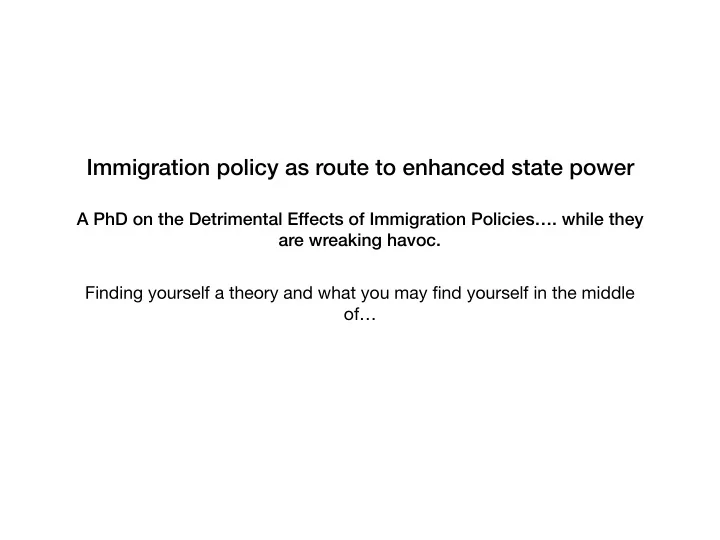

Immigration policy as route to enhanced state power A PhD on the Detrimental Effects of Immigration Policies…. while they are wreaking havoc. Finding yourself a theory and what you may find yourself in the middle of…
• Why state power? • What does it entail? • How does it relate to immigration policy? • How does it feature in institutional workings? • Can the EU’s JHA policies be viewed as a “state-building” e ff ort? • Why can o ffi cial documents provide useful insights into the harmful e ff ects of immigration policies?
Why policy studies? • Law: verifying the compatibilility of immigration policies as they are enacted with the normative framework. • Philosophy: the ethical dimension of immigration policies as they are enacted. • Policy studies: challenging premises and e ff ects that are inherent in an outlook in a critical vein rather than working towards making possibly irrational outlooks workable. Are there any limits to what may be done to assert a policy option?
Theoretical sources • Jessop (SRA): focus on “structurally-inscribed strategic selectivities” to explain how “sense- and meaning-making systems legitimize the orders of discourse, social forms and social practices associated with particular hegemonic and/or dominant social arrangements (Jessop and Sum, 2016: 108) • Poulantzas: described “authoritarian statism” as involving “intensified state control over every sphere of socio-economic life combined with radical decline of the institutions of political democracy and with draconian and multi-form curtailment of so-called ‘formal’ liberties” (1978: 203-216) • Gramsci: the “State = political society + civil society, that is, hegemony armoured by coercion” (2012: 274) • Foucault: racism viewed as intrinsically bound to bio-power and as producing power e ff ects, restoring the “sovereign’s” exercise of a “right over life and death” by introducing a break “within this domain of life over which power has taken charge” or within “the human race’s biological continuum” embodied by distinction between races, hierarchisation, classification as “good” or “inferior”, and expansive subsequent fragmentations (1997: 227-234) • Bacchi (WTP): focus on problem representation using a six-question approach; from “What’s the problem represented to be in a specific policy?” to how such a representation could “be questioned, disrupted and replaced?” (2009: xii)
Examples in practice • Fingerprinting: 100% by force if necessary • Relocations: Italy (75%); Greece (21 March 2016) • Restoring the credibility of the EU return system (requires ethnic profiling, raids targeting migrants and mass expulsions) • Readmission agreements (no questions asked, blackmail, involvement of consular authorities) • Externalisation (exporting policies whose detrimental e ff ects are obvious even within Europe, intensifying push factors) • Reintroduction of internal border controls justified on grounds of an influx of inadequately documented migrants
Recommend
More recommend